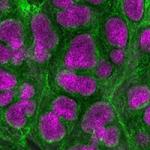
Claire Eliane Le Pichon, Ph.D.
Senior Investigator
Section on the Development of Neurodegeneration
NICHD/DIR
Research Topics
Our work is dedicated to advancing our understanding of common molecular and cellular mechanisms of neurodegeneration, with the ultimate goal of developing treatments for neurodegenerative diseases and even preventing them. The lab uses the mouse and human iPSC–derived neurons as model systems. One research focus is on mechanisms of stress-response pathways in neurons, such as the evolutionarily conserved axon-damage signaling pathway under the control of DLK (dual leucine zipper kinase; MAP3K12). This kinase is a critical regulator of the neuronal response to axon injury, and of neuron death in the context of neurodegenerative disease (Le Pichon et al., 2017). A second research theme is to understand what makes certain populations of neurons more vulnerable or resilient to neurodegeneration, with a particular focus on motor neuron diseases. Please see a full list of publications at https://www.nichd.nih.gov/research/atNICHD/Investigators/lepichon/publi….
Biography
Dr. Claire Le Pichon earned her B.A. degree from Cambridge University, U.K. and her Ph.D. in Biological Sciences from Columbia University in 2007 in the laboratory of Dr. Stuart Firestein, where her interest in neurodegenerative disease began while studying the function of the cellular prion protein PrPC. After her PhD, Dr. Le Pichon joined the Translational Neuroscience group at Genentech, where she worked on preclinical drug development for neurodegenerative disease pipeline targets, using mouse models of disease. She became an Investigator at the NICHD in 2016. Her laboratory employs a multidisciplinary approach including mouse genetics, wide-scale imaging of whole cleared tissues, single cell sequencing, CRISPR-based genetic screens and mechanistic studies in iPSC-derived neurons to investigate the early events underlying the onset, development, and progression of neurodegenerative diseases.
Selected Publications
- Alkaslasi MR, Lloyd EYH, Gable AS, Silberberg H, Yarur HE, Tsai VS, Sohn M, Margolin G, Tejeda HA, Le Pichon CE. The transcriptional response of cortical neurons to concussion reveals divergent fates after injury. Nat Commun. 2025;16(1):1097.
- Gómez-Deza J, Nebiyou M, Alkaslasi MR, Nadal-Nicolás FM, Somasundaram P, Slavutsky AL, Li W, Ward ME, Watkins TA, Le Pichon CE. DLK-dependent axonal mitochondrial fission drives degeneration after axotomy. Nat Commun. 2024;15(1):10806.
- Wlaschin JJ, Donahue C, Gluski J, Osborne JF, Ramos LM, Silberberg H, Le Pichon CE. Promoting regeneration while blocking cell death preserves motor neuron function in a model of ALS. Brain. 2023;146(5):2016-2028.
- Alkaslasi MR, Piccus ZE, Hareendran S, Silberberg H, Chen L, Zhang Y, Petros TJ, Le Pichon CE. Single nucleus RNA-sequencing defines unexpected diversity of cholinergic neuron types in the adult mouse spinal cord. Nat Commun. 2021;12(1):2471.
- Wlaschin JJ, Gluski JM, Nguyen E, Silberberg H, Thompson JH, Chesler AT, Le Pichon CE. Dual leucine zipper kinase is required for mechanical allodynia and microgliosis after nerve injury. Elife. 2018;7.
Related Scientific Focus Areas



Molecular Biology and Biochemistry
View additional Principal Investigators in Molecular Biology and Biochemistry


This page was last updated on Thursday, January 15, 2026